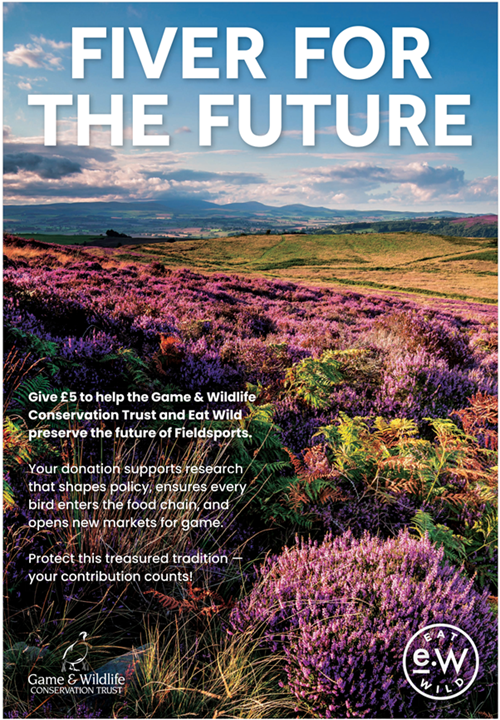
The Game & Wildlife Conservation Trust and Eat Wild have joined forces to call on all shooting grounds and schools in the country to support a new joint fundraising initiative called Fiver for the Future in a bid to help secure the future of Fieldsports in the UK.
It will run from 1 September until 24 December 2024. Clients who have enjoyed a lesson are urged to donate £5, with venues that secure the most in donations winning a lunch at one of the country’s top restaurants.
Eat Wild and the Game & Wildlife Conservation Trust (GWCT) are both fighting for the future of Fieldsports. Eat Wild’s mission is to ensure that every bird shot enters the food chain by opening up new markets for game and reaching out to and educating new consumers, while the GWCT conduct scientific research that directly influences government policy and promotes game and wildlife management as an essential part of nature conservation.
The funds raised through Fiver for the Future will be shared equallybetween the GWCT and Eat Wild to enable them both to continue their work and ensure that this cherished traditional activity is preserved for the future.
Shooting grounds and schools that have already agreed so support and promote the Fiver for the Future initiative include West London Shooting School, Holland & Holland, Honesberie, Hownhall Shooting, Barbury Shoot, Bisley, Grimsthorpe Shooting Ground, Coleys, and Purdey at the Royal Berkshire.
The venues that secure the greatest amounts in donations will be treated to lunch and refreshments at one of the following restaurants, who have all donated support towards Fiver for the Future; The Elder (Bath), The Woodsman (Stratford-upon-Avon), Harwood Arms (London), Chef Roux at The Langham (London) and Sussex Restaurant (London).
Louisa Clutterbuck, CEO of Eat Wild says: “We are so excited to launch this new fundraising initiative and are incredibly grateful to those who have already pledged their support for it. The key to the future of Fieldsports is in our willingness to work together and this initiative is an exemplar of this, with every penny raised by those in support of the shooting industry going towards creating new markets for game, important scientific research, instigating policy change, and education.”
Vanessa Steel, GWCT says: “We're thrilled to initiate our new 'Fiver for the Future' campaign, standing alongside the Eat Wild to champion the future of Fieldsports in the UK. This initiative not only brings people together in support of our traditions but also ensures that the vital work of promoting game, wildlife management, and ethical shooting continues for generations to come. By donating just £5, you're investing in the future of conservation and the sustainable use of our natural resources.”
-Ends -

For more information contact:
Eleanor Williams, GWCT Communications Officer
PR Contacts
Emma Sandham emma@zambuni.com 07802 725000
Iona Mackay iona@zambuni.com 07504 661424
About Eat Wild
Formerly a campaign of British Game Assurance (BGA), Eat Wild has established itself as the development board for British game since 2018, now including both Venison and Feathered Game. Eat Wild focuses on introducing new people to eating and cooking with game meat, as well as securing new markets for game. The game market has grown 7% since its operation began and has introduced hundreds of thousands of new people to game through events, marketing, and social media.
About the GWCT – Offering Hope for the future of Wildlife
For nearly 100 years the Game & Wildlife Conservation Trust has been a champion for wildlife through an evidence-led approach to conservation. From waders to woodland birds, game management to farmland ecology, wild salmon to pollinators and black grouse to moorland conservation – the breadth of research carried out by the GWCT makes it unique. Through sound advice and support the GWCT helps farmers, land managers and conservationists across the UK succeed in their mission to enhance the British countryside.
The GWCT believes that wildlife can thrive if we focus on integrating it alongside other land uses, and that game management can be both sustainable, improve biodiversity and aid species recovery. More than 70% of the UK is made up of farmland - by following GWCT guidelines farms have shown they can double their songbird numbers and remain just as productive as before.
We employ more than 60 post-doctoral scientists and other research staff with expertise in areas such as birds, insects, mammals, farming, fish and statistics. Our research and projects are funded by contract and grant-aid from Government and private bodies.